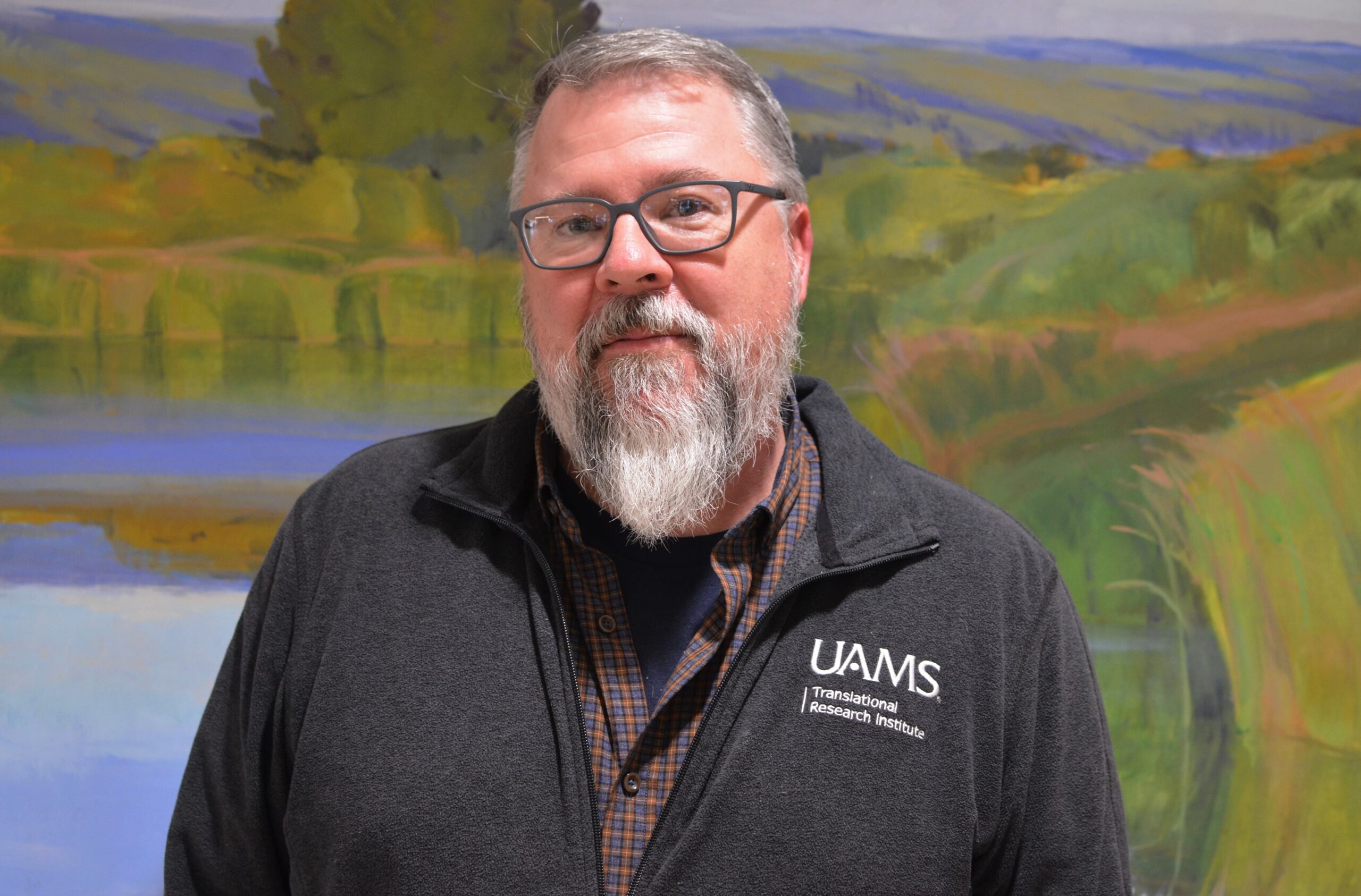Desire to Serve Led Paul Duguid to UAMS College of Public Health, Translational Research Institute
| Paul Duguid, MPH, an assistant director of funding programs for the UAMS Translational Research Institute, also is an alum of the University of Arkansas for Medical Sciences (UAMS) Fay W. Boozman College of Public Health.
Duguid, who started his public health education in 2007, credits the well-rounded nature of the college for helping to set the stage for his career with the institute.
“The mission of the Translational Research Institute is to develop new knowledge and approaches that will address the complex health challenges of Arkansas,” he said. “We focus on rural health and underrepresented populations. Both the mission of TRI and the College of Public Health directly translate into the kind of work, and the successes, I have in TRI.”
Both Duguid’s public health education and lived experiences influence his work.
Duguid lived in Topeka, Kansas, until he was 9, when his family moved to Smackover in south Arkansas. A town of fewer than 5,000 people, it didn’t take long for Duguid to notice a unique dynamic in Smackover — a realization that forever shaped his view of the world.
“Smackover is an oil boom town,” he said. “The town has an oil refinery in it. Growing up, I did a lot of riding bikes around in the woods past the oil fields. I saw the environmental and health impacts of the industry, and the wealth it created. There was a huge gap between those who owned the land with oil in it and those who worked on oil drilling rigs and in refineries. In Smackover, lower income residents and the people who were financially well-off, lived in close proximity to one another, and it was all very rural.
“My household, we were a lower middle-class family. My dad was in the restaurant business, and mom worked in a medical facility as an admissions clerk. My mom was always in the community helping people who needed assistance — delivering food or clothing, driving people to doctors’ appointments, whatever they needed. Seeing what mom did for people and how life was for some families around Smackover is what led to my interest in serving others and eventually public health.”
The desire to serve prompted Duguid to first attend SouthArk Community College’s paramedic program and earn his associate’s degree. Duguid would be a paramedic in rural areas of Arkansas before and after moving to Little Rock to attend the University of Arkansas at Little Rock, eventually earning a bachelor’s in technical and expository writing.
After completing his undergraduate education, Duguid interned with the UAMS Winthrop P. Rockerfeller Cancer Institute, where he worked in cancer education. Following the internship, he received a job in the Cancer Institute.
As Duguid learned more about public health and why the college existed, he knew he had to enroll.
“The theme of public health aligns with what I believe in regarding community health,” he said. “The college addresses the needs of Arkansas. That was the kind of work I wanted to connect with and the kind of work I knew was needed in many areas of Arkansas.”
He enrolled in the college’s Master of Public Health program with an emphasis in environmental and occupational health. The informative courses like public health law, along with the well-versed, compassionate instructors provided Duguid with a memorable experience.
“The college faculty were enthusiastic about public health and how the concepts helped our communities,” he said. “At that time, the school was still somewhat new, and Arkansas was in need of public health professionals. Everyone could sense the momentum as the teachers and students knew we were at the start of improving health and health care delivery in Arkansas.”
Duguid, who graduated in May 2010 and now volunteers with the American Civil Liberties Union, the Arkansas Coalition Against Sexual Assault and various environmental groups, appreciates how the college upholds its mission of service and making Arkansas healthier through research and innovative health care throughout the state.
“The college is focused on improving the overall health of Arkansas,” he said. “It’s a dynamic college. It’s ideal if you want a quality public health education directly relevant to the needs of our communities.
“The college has a very supportive environment. From the faculty, to the staff, to the other students — it’s a very positive experience. I enjoyed every moment in that environment.”
